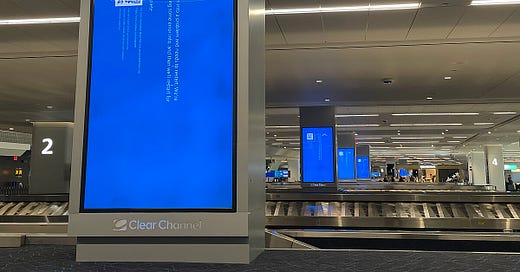"AUTONOMOUS": The Day The Computers Died
The day 8 million computers died, a barista at Starbucks made me laugh—and gave me a big idea.
JULY 19, 2024: THE DAY THE COMPUTERS DIED
It was "Crowdstrike Day," July 19, 2024. While 8 million computers displayed the blue screen of death and headlines screamed about system failures, I watched a counter person at Starbucks announce to a gathering line:
"I can't. I just can't. We don't have cash registers. We don't have our mobile app. I can't even send an order to the barista on her machine."
She paused, looked at the crowd, and reached into a drawer. Out came a pad and pen.
"Tell me what you want, I'll write it down, and the baristas will make it for you. And it's free. Let's do this!"
Her face held the rapture I imagine that first Capuchin monk had when he boiled coffee beans.
The Spark
I spend a lot of time thinking about how AI is going to become part of our lives. (See Disclaimer) But what happens on "Crowdstrike Day" when our AI systems fail? Would we know how to function? How would we react? Could we reboot—not just the machines, but ourselves?
I'm inviting you to join me as I write "Autonomous", a story about our AI-powered future. I'll take you behind the scenes of the writing process. I'm going to use (probably overuse) AI every step of the way. You'll get:
Front-row access to a writer's creative process in the AI age
Real-world tests of AI tools—the good, the bad, and the bizarre
A chance to shape the story through your feedback and questions
Think of this as part writers' room, part tech experiment, and part community discussion about where AI is taking us.
The North Stars
That afternoon, I sat down and wrote a list of inspirations—my North Stars for this journey:
Michael Crichton:** Because I love his tech thrillers, and he has an amazing way of diving right into the story while giving you all the science you need. You walk away from a Crichton novel feeling exhilarated and informed.
Black Mirror:** Who can write about tech without keeping an eye on this amazing series?
Kurt Vonnegut:** *Cat's Cradle* and *Player Piano*, mostly. Later, I'll come to rely on *Galapagos*, for reasons I'll explain. I love Vonnegut's style, his short and pungent chapters, and his generous spirit.
Nick Hornby:** So heartfelt and entertaining. Oh, and short chapters. As Vonnegut advises, "Pity the reader." Give them short chapters. Short paragraphs. White space.
Dr. Strangelove:** For me, the ultimate technocratic satire.
Catch-22:** A lot of boomer kids grew up loving *Catcher in the Rye*. I grew up loving *Catch-22*. Is there a better novel about the madness of human beings in all its forms? In high school, I wore an Army Surplus coat with the name "Yossarian" on the front.
TED Talks / Corporate Speak:** My suspicion is that AI in the near future will be controlled by a grouping of corporate and government organizations who constantly congratulate themselves on every new innovation as if they'd saved mankind "again." I knew that language would emerge in this story.
The Journey Begins
Over the next couple of weeks, I kept loose notes on AI-related concerns: displaced workers, data privacy, systemic biases. But nothing felt cohesive. I did a lot of writing with a pen on paper, or an Apple Pencil on an iPad.
In early August, I took a trip to Wisconsin with my high school friends. Being together reminds all of us of our own "Origin Stories," who we were at the beginning, and the long road to where we are now. I wanted to take this chance to be the person I was then (and luckily for me, the person I am now)... a writer.
The Meta Moment
Sitting down to write, I realized something obvious: I should use AI while I'm writing this story about AI. Not just use it—document it. Experiment with it. Push it to its limits
At the same time, I began to look out at the horizon for writers in the age of AI. I began to use the principles of Designing for Impact to guide my writing and to help ensure that I reached my audience, connected with them and built a relationship with them.
And so here we are. In the AI Writers’ Room.
This project isn't just about what I can create. It's about what we can explore together.
Your Turn
Share your "tech breakdown" stories: What's your "Starbucks" moment? How did you handle it?
Tell me about your influences: Which books, movies, or shows shape your vision of AI's future?
Suggest questions for "Autonomous": What should this story tackle about our AI-enabled world?
Your feedback will help shape the story as I write it, making this project as collaborative as it is experimental.
Coming Soon
In coming posts, 'll introduce you to my writing assistant, share insights about how I use AI, and discuss the good, bad, and bizarre of AI-assisted creativity.
Next up: How I'm using product design principles to craft "Autonomous"
Subscribe now to follow the story in real time. Let's figure this out together.
And if you know someone who might enjoy diving Into the conversation, please share with them.



